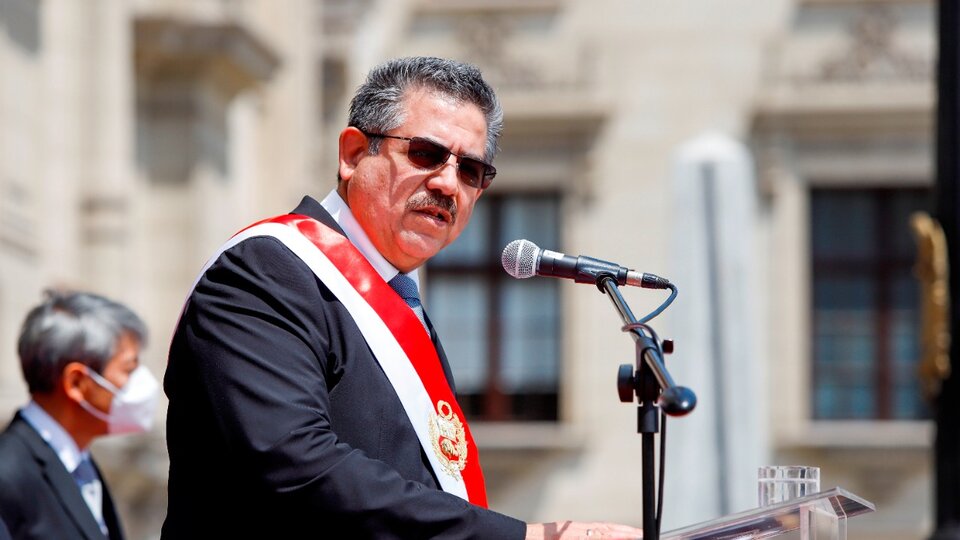
[ad_1]
In a new symptom of the chronic putrefaction suffered by Peruvian institutions, Congress sacked the president Martin vizcarra in a very loose maneuver of roles which exacerbates the multidimensional crisis that the country is going through and consolidates the very strong discredit towards the political class. Democratic fragility astonishes in the face of the decadent decline of the last six presidentss: all were dismissed and / or imprisoned, except for Alan garcia that he did not go to jail because he committed suicide a few minutes before being arrested.
Only five months before the presidential elections, and in a second attempt, the vacancy motion was finalized which sealed the downfall of Vizcarra, who had assumed in March 2018 the resignation of Pedro Pablo Kuczynski, who was his vice-president, due to corruption. The charge under the vague number of “moral incapacity” was based on alleged bribes in the call for tenders for two public works when Vizcarra was governor of Moquegua (2011-2014), in an investigation which is only at the preliminary stage. The one who promoted the play was the cattle rancher Manuel Merino (Photo)Leader of Congress now the new president, and was executed by a Parliament that has 68 of 130 lawmakers sued for corruption and thirst for immunity. The murky express maneuver installed the idea of a coup – much like the parliamentary overthrows suffered by Dilma in Brazil and Fernando Lugo in Paraguay – and generated massive repudiation in the streets with uncertain outcome.
The episode only did accelerate the self-destructive spiral of an increasingly degraded political system, marked by endemic corruption and a clash of powers. A deep political, moral, economic and health crisis: Peru is the second country in the world with the highest coronavirus death rate. A complex plot, the clearest expression of which is the plight of presidents over the past 20 years:
* Alberto Fujimori (1990-2000): Symbol of an era, became a dictator with the 1992 auto-coup. In November 2000, he escaped to Japan from where he resigned by fax a day before let Congress approve his removal. In 2009, he was sentenced to 25 years in prison for crimes against humanity.
* Alejandro Toledo (2001-2006): Blamed in the Odebrecht case for receiving around $ 30 million for the benefit of the Brazilian construction company. He was a fugitive from justice for three years in California, United States, where he was arrested in July 2019 and is under house arrest pending extradition.
* Alan garcia (1985-1990 / 2006-2011): He faced various corruption charges during his last term. Prosecuted in the Odebrecht case for alleged corruption in the construction of a train, he committed suicide in April 2019 as the police were preparing to arrest him.
* Ollanta humala (2011-2016): In July 2017, he was sentenced to 18 months in pre-trial detention for money laundering and unlawful association to commit a crime, accused of receiving three million dollars from Odebrecht for his campaign . Although he is on probation pending trial, he recently announced his presidential candidacy for 2021.
* Pedro Pablo Kuczynski (2016-2018): He resigned a day before Congress voted for his impeachment and became the first Latin American president to lose his post due to Odebrecht’s corruption scheme. He is under house arrest for alleged money laundering and for having received 782,000 dollars from the Brazilian company.
Expired winners
The chapter of Vizcarra, the sixth consecutive president to fall from grace, is different from the others and his departure feels more like a parliamentary coup. Although his brief tenure did not deviate from neoliberal continuity and his foreign policy remained aligned with Washington, he tried to promote some anti-corruption reforms. and in 2019, he dissolved the contested Congress calling for new elections. Without a party or a legislator, Vizcarra was targeted by a parliamentary majority (elected in January of this year) which ended up wreaking havoc, appealing to the diffuse figure of “vacancy due to moral handicap” which serves as a mechanism for dismissal without need long debates or a lot of argumentative solidity.
Two decades are over during which Peru was informed of the recurring scandals that shook its presidents; spasms of the organic crisis of a regime shaped by the 1993 Fujimori Constitution. In the short term, the challenge arises that in the April elections popular discontent can finally be capitalized by a progressive force, like the New Peru by Verónika Mendozat. It is imposed, as a long-term objective, the desire that the Peruvian people, like their neighbor Chile, can overthrow this heavy Fujimori heritage and begin to write a new history..
* NODAL editor. Author of the book “Latin America. Traces and challenges of the progressive cycle”. He hosts the radio show “Al sur del Río Bravo”.
.
[ad_2]
Source link
 Naaju Breaking News, Live Updates, Latest Headlines, Viral News, Top Stories, Trending Topics, Videos
Naaju Breaking News, Live Updates, Latest Headlines, Viral News, Top Stories, Trending Topics, Videos